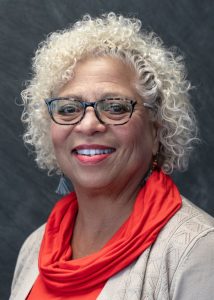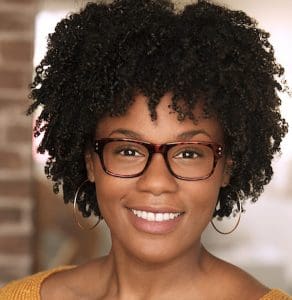Smaller arts groups are often nimbler in negotiation large-scale cultural shifts than their larger counterparts. As early as 2016, Kansas City Actors Theatre changed its slogan from “Classically Trained Actors, Classic Plays” to “Great Actors, Smart Plays.”

Lydia R. Diamond
A subtle shift, perhaps, but a step toward responding to community needs: During the COVID-19 pandemic, Kansas City’s most sophisticated “locally sourced” company spent a great deal of time rethinking its priorities and values. And it discovered a need for some fundamental changes.
It’s not that Actors Theatre is turning its back on classics of Tennessee Williams, Edward Albee, or Agatha Christie, but rather that it is determined to present, alongside established works, top-drawer newer plays that might in fact someday be classics: and especially those that tell stories of under-represented communities.
But actions speak loudest, and this season audiences have already observed a notable shift in the company’s focus. With the brilliant run of actor-playwright Colman Domingo’s 2015 play, Dot, this September, the company presented work of a Black author for the first time in its 18-year history.
In January it will open its first play by a Black woman, Lydia R. Diamond’s Smart People, a searing, fiercely funny conversation about race, class, politics, and sex.

Jerry Mañan
“Adding diversity to the mix was already on the company’s radar” before 2020, said Actor Jerry Mañan, a member of the group’s artistic committee. But it was during that spring and summer, when COVID-19 shut down theaters and America responded with mass protests to the murder of George Floyd, that it became clear that “drastic action had to take place for us to become more inclusive,” Jerry said. “We realized this can’t be the second or third or fourth thing on our list any more. This needs to our number one priority.”
These changes went beyond programming: A new committee on Equity, Diversity and Inclusion was formed in 2021 to help corral new voices on all levels: Not just BIPOC playwrights (Black, Indigenous, and People of Color), but also directors, designers, and production personnel.
The company also launched its first Amplify: Young Writers Contest to encourage underrepresented kids to tell their stories. “You stop theorizing and philosophizing,” said Jerry, an Avila University-trained Latinx actor who made a powerful impression in Dot. “It becomes about action, doing the work that’s needed.”

Ile Haggins
Today we don’t have to look far to find great works that tell stories other than those of white, middle-class America. “People were writing them, the works existed,” said Ile Haggins, a veteran Kansas City stage artist and longtime UMKC professor, who directs Smart People. “There is finally an appreciation for and a validation of the fact that there are African-American writers, and women playwrights… whose work is just as good as ‘fill in the blank’… or better than.” The new prominence of these works has highlighted “a broader society’s awareness that there was an awful lot of really good art that they were missing out on,” Ile added.
The importance of these stories cannot be overstated. “All theaters have an obligation to be stretching and pushing their audiences, and not just feeding them the Pablum that they might be accustomed to,” Ile said. “You have to be careful not to pander, but you need to push your audience. … They should be stretched, feel uncomfortable in the theater at times.”
What is especially appealing about Lydia’s Smart People, which is set on the eve of President Barack Obama’s inauguration, is its use of humor to disarm us into pondering difficult ideas. “Her writing is so witty and intelligent… that she can make points without hitting you over the head,” Ile said, “and without underestimating the intelligence of her audience. I love playwrights that work from that perspective.”

Ashley Kennedy / Photo by Exposure Inc
Lydia’s ability to disorient is essential to this play’s impact. “I’ve become fond of pieces of theater that make the audience squirm,” said Brian Paulette, a longtime Actors Theatre member. “What is good theater if it’s not forcing people to face some uncomfortable truths about society, and about themselves?”
Brian plays the role of a white professor (also named Brian) whose life ambition as a neuropsychiatrist is to measure electrical responses in the brains of test subjects toward proving “that all whites are racist.” To which Valerie, a struggling Black actress yearning to perform Shakespeare (played here by Ashley Kennedy), responds: “You didn’t know that?”
Brian’s investigations are, understandably, controversial among the other three characters. Jackson, a Black surgical intern who plays basketball with the professor, wonders whether his studies don’t simply indicate “how early and effectively a racist society imprints.”
Brian’s research is likely to stir discourse among audience members, too. “If the conversations are not already underway, let this be the prompt to start those uncomfortable conversations,” said Ai Vy Bui, who plays Ginny, a psychology professor conducting research on racial identity among Asian-American women. “Because without them, we’re not able to move.”

Brian Paulette, Ai Vy Bui, and Terrace Wyatt, Jr.
Public discourse on race “has become so divisive that people aren’t willing to actually hear what the other person is saying,” Ai Vy said. “But if we don’t have the conversation, where do we go?”
Works such as Lydia’s have been around for a while, “but they just hadn’t filtered into what’s thought of as the ‘cornerstone’ of the theater community,” Ile said. “Actors Theatre came forward with a very strong statement on diversity. … They recognized the fact that they had not been about the work that they wanted to be about. This season is where this is really showing up, and that’s not by happenstance.”
—By Paul Horsley
Smart People runs from January 18th to the 29th at H&R Block City Stage at Union Station Kansas City. In addition to Ashley, Brian, and Ai Vy, it also stars Terrace Wyatt, Jr. For tickets call 888-343-6946 or go to kcactors.org.
To reach Paul Horsley, performing arts editor, send an email to paul@kcindependent.com or find him on Facebook (paul.horsley.501) or Twitter/Instagram (@phorsleycritic).